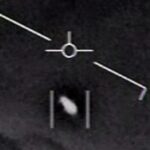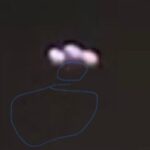 Что на самом деле говорят американские подводники об обнаружении так называемых неопознанных затопленных объектов
Что на самом деле говорят американские подводники об обнаружении так называемых неопознанных затопленных объектов
На нашем сайте вы можете: подробнее узнать, что скрывается под аббревиатурой НЛО; посмотреть фото- и видеосвидетельства самых необычных явлений, которые зафиксированы на нашей планете и за пределами Земли. опубликовать свои истории, связанные с НЛО в рубрике «Глазами очевидцев» пройти тест и узнать, что вы знаете об этом феномене НЛО; узнать, кто из знаменитостей видел НЛО, и что они об этом думают; ознакомиться с подборкой захватывающих фильмов и книг про НЛО; изучить вместе с вашими детьми рубрику «всё об НЛО для самых маленьких». P.S. Вы когда-нибудь видели что-то похожее на НЛО? Или считаете, что все представленные материалы — это лишь неудачно снятые опознанные летающие объекты, а свидетельские показания — предмет разыгравшегося воображения впечатлительных людей? Поделитесь с нами вашим мнением!

 Что на самом деле говорят американские подводники об обнаружении так называемых неопознанных затопленных объектов
Что на самом деле говорят американские подводники об обнаружении так называемых неопознанных затопленных объектов
 BBC: Если инопланетная жизнь обладает искусственным интеллектом, она может быть более странной, чем мы можем себе представить
BBC: Если инопланетная жизнь обладает искусственным интеллектом, она может быть более странной, чем мы можем себе представить
 Подборка кадров с НЛО
Подборка кадров с НЛО
 Интервью в Зоне 51 и возможный тревожный результат
Интервью в Зоне 51 и возможный тревожный результат
 Частью медленного раскрытия является Голливуд?
Частью медленного раскрытия является Голливуд?
 Полковник армии США признает, что программы обратного проектирования НЛО действительно существуют
Полковник армии США признает, что программы обратного проектирования НЛО действительно существуют
 Йохан ФРИЦ и Джоди Рейноса. Первое публичное интервью с женой. Часть 1
Йохан ФРИЦ и Джоди Рейноса. Первое публичное интервью с женой. Часть 1
 12-летняя полицейская ИК-съемка объекта, сбрасывающего расплавленные вещества с невероятной скоростью.
12-летняя полицейская ИК-съемка объекта, сбрасывающего расплавленные вещества с невероятной скоростью.
 Обнаружена горячая точка НЛО: зарегистрировано около 2000 сообщений о «феноменах» в небе
Обнаружена горячая точка НЛО: зарегистрировано около 2000 сообщений о «феноменах» в небе
 Может ли кто-нибудь это определить?
Может ли кто-нибудь это определить?
 Вчера вечером в Фулшире, Техас.
Вчера вечером в Фулшире, Техас.
Former anti-subarmine, active and passive sonar operator here. I worked on anti-sub frigates specifically designed for underwater warfare. I was also a surface/air radar operator.
Active sonar is like radar, sound goes out, hits something and sound comes back. It is typically used when the risk is «low», as it gives away the position of the vessel- it’s accurate and at least in my experience, reliable enough that you don’t often get spurious tracks. You can’t hear anything other than the ping going out, at least not in the same way you hear things on passive sonar (there may be other active sonar out there
Passive sonar is effectively a microphone and in lots of ways, is far more powerful (in my opinion — this was my area of expertise). It returns the frequency of sound (and the sound itself) and you can hear this through headphones.
The sound is displayed on a monitor in such a way that you can identify things like number of propeller shafts, number of blades, speed etc of whatever vessel you’re listening to.
With passive sonar, you can even hear things like shrimps cracking.
My point is that underwater tracking is easier than you may think and you get an incredible amount of information, especially from passive sonar.
I’ve even heard music and voices from a submarine, tracked by a surface ship.
There is a huge book in the ops room which has almost every known allied and foreign vessel and the frequencies they emit (such as gearboxes, propeller shafts etc), this makes it very easy to identify a vessel, even down to a specific class.
The only strange thing I’ve experienced (and not directly) was while we had the passive sonar deployed just off the Irish coast in the Atlantic.
I wasn’t on watch at the time, but there was much discussion the next day — apparently we had found «something» on sonar and got a solid track, but we’re unable to classify it using the book in the ops room. The skipper was notified for some reason, came down to the ops room and ordered the guys on watch to pack everything up and stop tracking.
The theory from everyone at the time was that we had accidentally found one of the new astute class submarines, which was supposed to have been incredibly difficult and effectively «impossible».
I can also add something to radar, since that was my primary role (sonar was an additional skill I trained in, and during anti submarine ops, that was my primary role).
But I can say that on both surface and air radar, it is common to get spurious tracks (more so on surface radar as it can sometimes return from waves and whatnot).
In the event that an operator sees either a spurious «track» or a spurious «contact», they will ask the bridge to look visually and try to determine what it is.
It is far less common (but it still happens) to get spurious air contacts or tracks and I can’t recall a single time where it’s happened — however I can say with confidence that it would be very clear to even a junior radar operator, whether a radar contact was spurious or genuine.
Additionally, every aircraft (at least civilian) broadcasts it’s IFF code, so you know instantly whether it’s an airline or something else. If you see something with no IFF code, you investigate immediately regardless of where you are in the world.
Ex-sub guy here:
This seems really sensationalized. I think there’s a misconception that everything you hear under the water is known… that’s hardly the case.
Disclaimer before I go too much further into this, I worked in the engineroom, so I’m far from an expert on the daily ins and outs of sonar, but I had a few sonar tech buddies.
Anyway, there are so many random ass noises they hear under water it’s hard to understate. There’s all kinds of weird noises underwater… water is an excellent conductor of sound so it’s not uncommon to hear noises from hundreds of miles away. I heard all kinds of “weird noise” stories from my friends who worked up forward on the sonar stacks. There’s apparently even a fish out there they call the “demon pig fish” because of its awful squealing sounds.
I don’t doubt that there’s some kind of secret program to track noises of interest up in the forward part of the boat but I never heard anything about it officially. The guys who worked up forward all had higher clearances and *officially* had to be kinda tight lipped about some things.
You bet your ass if they told them about aliens though that there would have at least been rumors though. I didn’t hear a peep about anything like that in my time in though…
Russian submariners talk about «croakers» that move fast underwater.
Mr. Paul Stonehill
Russia’s USO Secrets: Unidentified Submersible Objects in Russian and International Waters
Im gonna come out and ashk what we all wanna know. Is it the ghosht of Sean Connery?
Just a debunker piece. Probably written for the author’s peace of mind. You know how badly this subject upsets people who have already decided that they know the total boundaries of reality.
Fast Mover Program. Never heard of that terminology, cool!
Squakers!
So now its going to another 1-3 decades of bullshitting the general population about what’s really in the oceans, just like they’ve done since the 1940s about people seeing or hearing things in the skies.They’ve been here long before us, how much of the worlds oceans are still undiscovered or untouched, goes without saying really.
I was under the impression that the sonar equipment and displays were heavily guarded secrets that the Navy might not want them to fall into the hands of video game makers.